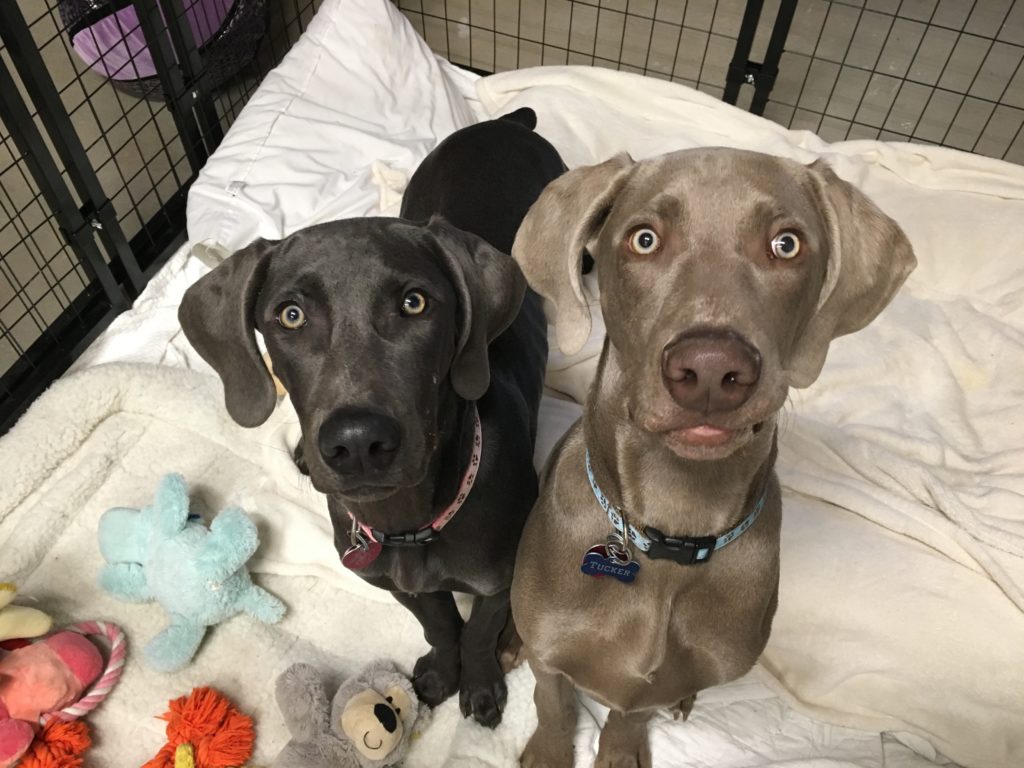Great Puppy Training Tips Stop a Pair of Weimaraners From Nipping and Mouthing
By: David Codr
Published Date: January 23, 2017
Lyly and Tucker are brother and sister Weimaraners who live in Omaha. Their guardians asked me for some puppy training help to keep them from getting over excited, jumping up on people and stop nipping and mouthing when excited.
The dogs were out back when I arrived for the session so I had the guardian let them in so that I could see how they behaved with meeting a new person for the first time.
I frequently run into dog guardians who attempt to sooth their dog and calm it down by repeating a phrase or two over and over such as “it’s OK” or good dog. What the human is attempting to do is verbally communicate to the dogs what they want.
But because dogs don’t speak English and learn through association, repeating this type of expression over and over when the dogs are in an excited or otherwise unbalanced state of mind can actually train the dog to engage in the exact behavior that the human is trying to avoid.
A better method is to pet the dogs for sitting when a guest arrives. We call this manding. If the dogs don’t sit and try to get to the guest instead, the guardian should take a sudden step between the human and dog and keep their hips pointed at the dog until it stops.
After the greeting, I sat down with the dogs and their guardian to get a little bit more information about their daily routine, training and confidence levels.
The dog’s guardians had incorporated more rules and boundaries then most of the clients that I work with and were really well trained for how young they are. This structure allowed us to move faster than I typically do in my sessions.
I explained how important it is for the guardians to pet or correct the dog within three seconds of them engaging in an action or activity in order for the dog to understand what the human was trying to communicate.
I also recommended that the guardian practice my petting with a purpose method. This involves asking the dog to sit, come or lie down before petting it or providing her with any attention. By asking the dog to “pay” for attention by doing something easy like sitting, we can help it understand its place is to ask, not tell the human what to do.
I also advised the guardians to avoid petting or interacting with the dog when they are in an excited state of mind. Many people mistakenly think excited translates to happy for dogs. While many dogs are excited and happy, it is still an unbalanced state of mind.
By waiting for the dog to calm down before we give it attention or the reward, we can help it understand that at home, balanced energy is what the human wants, rewards and responds to.
One of the major problems the guardians wanted me to help was Lyly’s habit of nipping people when she is over excited. I share a number of tips and techniques to stop dog nipping that I have learned as a dog behaviorist in the video below.
There will be situations where different techniques will be more appropriate than others. But these secrets to stop dog nipping will come in handy for the immediate future until the dogs completely stop nipping.
ROADMAP to SUCCESS
- Avoid using the expression “Its ok” when the dogs are excited
- Do not pet the dogs when they are in an excited state like when coming home.
- Pet Lyly and Tucker with a purpose.
- Define human’s personal space an disagree when dog gets too close or nudges, leans on or jumps up.
- Get into a habit of walking through and not around the dogs so they get used to deferring to humans.
- Use the Escalating Consequences to disagree with unwanted behaviors.
- Enforce rules and boundaries consistently to help the dogs see themselves in the follower position (sit at the door, not near a human eating, wait on stairs, etc.
- Reward or disagree within 3 seconds to help the dogs better understand what you do or don’t want.
- Only let dogs out of the kennel when calm.
- Do not give the dogs inappropriate objects to chew on like old shoes or water bottles.
- Make the dogs sit and wait for permission to go out the door.
- Take Lyly out for some exercise before guests arrive if possible.
- Continue training the dogs with new commands and tricks.
- Look for opportunities to ask the dogs to wait or delay gratification to help them develop more self control.
Categorized in: Puppy Behavior


